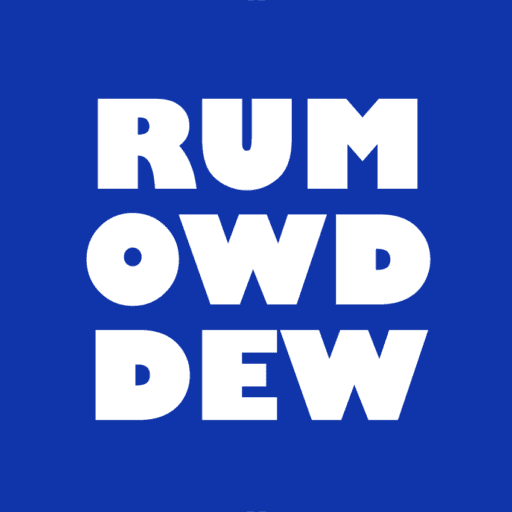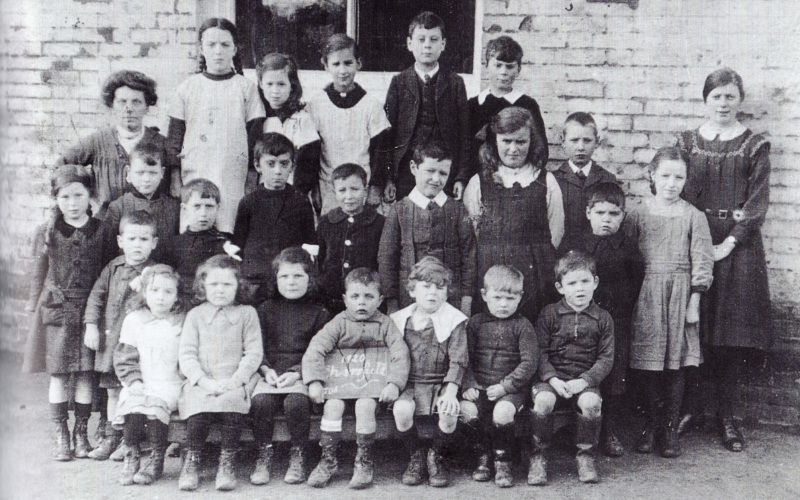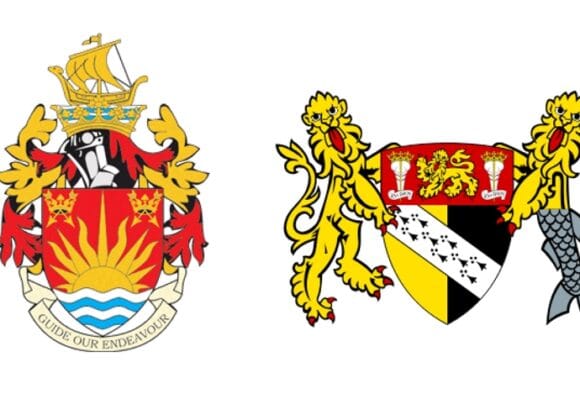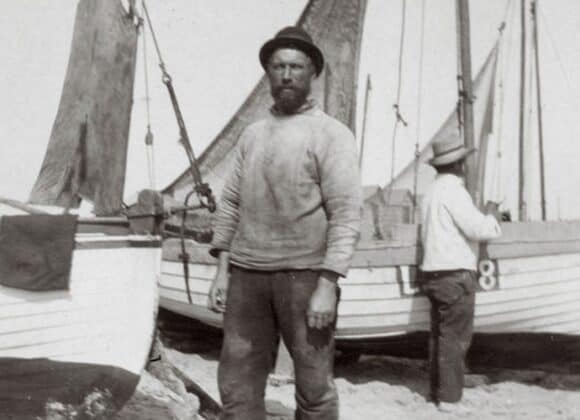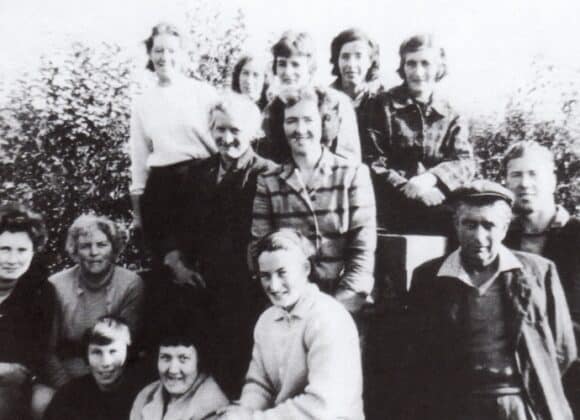In Learning Suffolk Part 1, Larn’un Suff’k (Part 1), we had an introduction to the Suffolk dialect and it’s quirks. Let’s now take a further look…
Plurals without the ‘s’
It is quite common for the ‘s’ to be dropped from the end Suffolk plural words. Equality, singulars are often used as the plural. Here are some examples:
Allbra is ‘bowt sev’n moile off th’ ay twelve.
Th’ingreediants say three pownd a sugar, not fower.
Oi hed t’ pay two pownd fer a point in ‘at ‘air hootel.
Moy son Dayv’d he stand six foot tall.
Greedy bugger hev three meal a day.
In contrast, When learning Suffolk is also famous for its double plurals. Sometimes docky, which is a mid-morning snack (so called because the farmer docked the pay for the break), is referred to as elevenses.
Likewise at 4 o’clock in the afternoon, when it’s time for beavers, it was sometimes referred to as fourses.
Moy booy Soim’n gota hully grit owd foot. Tayke soize twelveses. Moy Aunt counts ’em in twos ‘n’ threeses.
The Old English plural suffix ‘en’ is present in the English language, in for example, words such as men, women, children or oxen. In Suffolk, the older generation still drop a few more into their language:
At Brand’n bus-‘at stop by th’ row a cowns’I howsen.
Wee’ll hatter stop ’em ‘air booys goo’n arter buds’ neezen.
Moy cat, she do ketch a hoof load a meezen.
Oi say, he say, she say, ‘ay say
When older Suffolkers recount a story where the conversation is the most prominent matter, the past tense (said) of the verb ‘to say’ is rarely used.
Oi met owd Bill yestdee, ‘n’ he say t’ me ‘Hev yew heard?’
So Oi say, ‘Hev Oi heard what?’
‘N’ he say, ‘Moy woife Mayble, she say vicar’s buggered off with th’ cleaner.’
So Oi say, ‘What did th’ vicar’s woife say?’
Well … Bill say, ‘Moy Mayble, she say th’ vicar’s woife say “Bloody good ridd’nce'”. “Glad to git rid on ’em,” she say.’
Together (t’gather, t’gither, t’gether)
When learning Suffolk grammar, t’gather is a natural way to address to people. And therefore amuses ’em ‘air furreners.
‘Ken we hev yew awl gitt’n on th’ bus, one at a toime t’gather.’
‘Oi want yew awl t’ stand in single foile t’gather.’
If it was time to go out somewhere, whether there was just one other person or a group of multiple people, ‘come along t’gather would be the instruction. An Suffolker leaving the pub regardless of whether one customer remained or many, they would still say, ‘Cherrioo t’gather‘.
An amusing story is when a posh London school sixth form went on an overnight field trip to East Suffolk. At the accommodation, the girls were in their dormitory and the boys separately in theirs. In the morning, when all the boys and girls were rejoined and sitting down to breakfast, the Suffolk cook Said to everyone, ‘Hoop yew awl slept well t’gather‘.
Did she know more than she should have done? Anyway, Haps we move along t’ th’ next section t’gather.
Toime (time)
Toime is often used for ‘until’, ‘while’ and ‘before’.
Oi’II wayte fer a month a Sundees toime acters dew a Suff’k accent. Oi’Il dew moy weed’n, toime yew goo t ‘th’ shops ‘n’ back.
Bee’n (being) and oonly (only)
These two terms are often used to introduce a cause or an explanation.
He coon’t play t’day, bee’n he wuz injur’d.
She coon’t understand th’ Suff’k dialect, bee’n she wuz a furrener.
More people bort ‘iss ‘ear book, bee’n ‘at wuz a bess seller
Oi’d a work’t on th’ gard’n, oonly ‘at wuz too wet.
He’d a gone t’ th’ match, oonly he hent enny munny.
Suffen (something)
Commonly used in place of ‘very’ or hully/hooly and appears regularly in Suffolk speech.
Cood a hell, ‘at wuz suffen cowd s’morn’n.
‘At ‘air Lunnener he talk suffen quick, ‘n’ Oi lissen suffen slow.
Duzzy bugger hed t’say things twoice toime Oi unnerstood.
My dear mother used to do the weekly crossword in the local paper. When she was stuck on a particular word and asked me for help, and where she some letters in the answer, she would say “tew across… noine letters: suffen, suffen, N, suffen, U, suffen, suffen, suffen?“.
Shew instead of showed
In English we have several past tenses ending with the letter ‘ew’ For example: grew, threw, drew, flew and knew. These are the last remnants of Middle Ages English, especially for verbs ending in ‘ow’. Since the Middle Ages, most of the ‘ow’ ending verbs took on a normal past tense with the ‘ed’ suffix (bowed, flowed, towed). But when learning Suffolk we stuck with the Old English form.
Oi shew ’em how t’ do ut.
It is fair to say that Suffolkers get corrected more times by outsiders for saying shew than for any other word or phrase. Other examples of ‘ew’ are:
‘At suffen snew s’morn’n; snoow wuz three foot deep.
Oi hew th’ gaard’n yes’dee ‘n’ may back ayke!
He mew th’ lawn afore a frorst, duzzy bugger.
Th’ owd cock crew at fower s’morn’n.
Marn’t (must not) and dussent (dare not)
These two little words will distinguish an owd Suffolker immediately.
Yew marn’t goo a chuch in yer work’n clothes.
Oi dussnt be layte fer work.
He dussent cheek th’ maarster, else he’ll git a clip a th’ lug.
Many of these Suffolk expressions and usages are left over from Olden or Middle Ages English. It is possible that Suffolk has held on to more Old English / Anglo Saxon words than any other dialect.
For more on the Suffolk language, see the book Rum Owd Dew Huh by Charlie Haylock.
